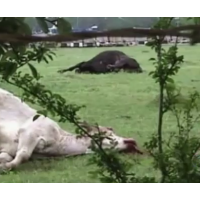Is Fracking Contaminating U.S. Livestock?
 Cow deaths caused by fracking in Louisiana (photo: 60 Minutes, CBS)
Cow deaths caused by fracking in Louisiana (photo: 60 Minutes, CBS)
Like canaries sent into coal mines to warn of breathing hazards, livestock in areas where hydraulic fracturing (“fracking”) is occurring are getting sick and dropping dead in alarming numbers, according to the only peer-reviewed scientific study of the impact of fracking on animals. And if cattle are getting sick because of fracking, what about the health of people who later drink their milk or eat their flesh?
The study, authored by Prof. Robert Oswald of Cornell University’s College of Veterinary Medicine and practicing veterinarian Michele Bamberger, compiles case studies of 24 farmers in 6 states whose livestock experienced neurological, reproductive and acute gastrointestinal problems after exposure to fracking chemicals in the water or air.
The case studies include 17 Louisiana cows that died of respiratory failure after an hour’s exposure to spilled fracking fluid; 70 Pennsylvania cows that died after 140 of them were exposed to fracking wastewater from an impoundment breach; and a Pennsylvania herd whose pregnant cows had a 50% rate of stillborn calves after grazing in a pasture contaminated by fracking chemicals from an overflowing waste pit.
Fracking a single well requires up to 7 million gallons of water, as well as an additional 400,000 gallons of additives. A 2011 study compiled a list of 632 chemicals used in natural-gas production and determined that 75% could affect the skin, eyes, other sensory organs, and the respiratory and gastrointestinal systems; 40-50% could affect the brain/nervous system, immune and cardiovascular systems, and the kidneys; 37% could affect the endocrine system; and 25% could cause cancer and mutations.
Cattle that die on the farm aren’t supposed to get into the nation’s food system, but herd mates that look healthy, despite being exposed to the same toxins, do. “They’re making their way into the food system, and it’s very worrisome to us,” Bamberger explains. “They live in areas that have tested positive for air, water and soil contamination. Some of these chemicals could appear in milk and meat products made from these animals.”
Although there have been few cattle deaths so far, some institutions that specialize in risk management have begun to see the pattern and take action. For example, Nationwide Mutual Insurance, which sells agricultural insurance, has announced that it will not cover damages related to fracking, and Rabobank, the world’s largest agricultural bank, is said to no longer sell mortgages to farmers with gas leases. Some farmers whose land sits atop the Marcellus shale are migrating to land outside that fracking zone, causing shifts in land prices.
If insurance companies won’t insure losses from fracking, and farmers and ranchers don’t want to raise food in fracking zones, should consumers beware of eating it?
-Matt Bewig
To Learn More:
Fracking Our Food Supply (by Elizabeth Royte, Food and Environment Reporting Network)
Impacts of Gas Drilling on Animal and Human Health (by Michele Bamberger and Robert Oswald, New Solutions) (pdf)
Animal and Human Health Impacts from Gas Drilling: Peer-Reviewed Study (by Iris Marie Bloom)
- Top Stories
- Unusual News
- Where is the Money Going?
- Controversies
- U.S. and the World
- Appointments and Resignations
- Latest News
- Trump Orders ICE and Border Patrol to Kill More Protestors
- Trump Renames National Football League National Trump League
- Trump to Stop Deportations If…
- Trump Denounces World Series
- What If China Invaded the United States?






Comments